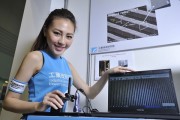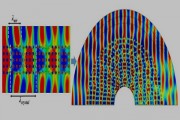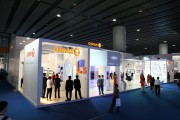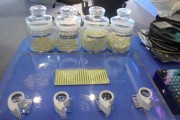2017-02-18
Solution based materials are a different way of processing the conventional OLED materials. So conventional OLED materials are processed by vacuum thermal deposition or heating up a powder in a crucible and evaporating it onto the substrate. Solution process materials are dissolved in a variety of solvents and then they can be coated by spin coating for lab sized experiments, or ink-jet printing, or slot-die coating, or a variety of other printing methods.
Continue reading →
2017-02-18
Light extraction is the process of removing light from the device itself. So when the device emits a photon, it gets trapped in the glass, in the organic layers themselves in the metals. And the-- what our challenge is, is to get all of that light into the viewing angle. So that when somebody sees the OLED they're seeing the full efficiency of that device. Rather than having light lost in the various segments.
Continue reading →
2017-02-18
The thing that actually converts electricity into light is the emitter itself. So there are a number of scientific challenges that are still out there in OLEDs, particularly in emitters. Even though you can go to the cell phone store and buy yourself a cell phone that's powered by OLED emitters, and active matrix OLEDs are present in cell phones and in televisions, and it leads people to think that all of the issues are solved.
Continue reading →
2017-02-18
OLEDs are based on organic (carbon-based) materials. Unlike LEDs, which are small point sources, OLEDs are made in sheets that provide a diffuse-area light source. While developing rapidly, OLED technology is less mature than LED technology, whose rapid advancement has created a moving target for OLED products in terms of lighting performance and pricing. Still, OLED manufacturers are optimistic that with a few key breakthroughs, OLEDs will offer a value proposition complementary with LED lighting approaches.
Continue reading →
2017-02-18
Like any new technology, LED lighting must demonstrate a compelling value to buyers before it begins to win sizeable market share from the incumbent technologies it will replace. Over the past decade, research and development have yielded impressive improvements in the cost, color performance, light output, efficacy, reliability, lifetime, and manufacturability of LED products. Looking at LED packages specifically, the cost in dollars per kilolumen ($/klm) has been declining rapidly since 2005 at a rate of around 20% per year. As a result, LED lighting products have become competitive in almost every lighting application, but there is still room for improvement.
Continue reading →
2016-11-07
Once considered the top business to sale off, Samsung Electronics LED business has made an impressive turnaround recently, reported Business Korea.
Continue reading →
2016-11-01
Despite of the tremors of explosive Galaxy Note 7 sent down Samsung Electronics finances, the company reported operating profits surpassed KRW 5 trillion (US $4.37 billion) during third quarter of 2016, driven by its semiconductors and display businesses, reported Business Korea.
Continue reading →
 2016-10-27
2016-10-27
Smart manufacturing will be the key to upgrading the printed circuit board industry! ITRI exhibited its expertise in innovative PCB manufacturing technology at the TPCA Show 2016, displaying the High Aspect Ratio Maskless Fine Line Printing Technology and Additive Process for Printed Fine Line Circuits, as well as its Intelligent Power Module for Automotive Battery Control. ITRI's innovative technology will assist in propelling the value of both the upstream and downstream sectors of Taiwan's PCB industry, thereby solidifying the foundation in making the industry a trillion dollar one in the future.
Continue reading →
2016-10-05
Osram has gained the services of Thorsten Müller as its new Head of Innovation and Research. The 39-year-old is currently the CEO of the Connected Devices and Solutions division at Bosch and will take up his new position as Head of Corporate Innovation at Osram on December 1, 2016. “Thorsten Müller is an acknowledged expert on the Internet of Things”, said Stefan Kampmann, Chief Technology Officer (CTO) of OSRAM Licht AG. “He will provide us with valuable impetus for the ongoing digitization and connectivity in the lighting industry and drive forward our transformation into a high-tech company.”
Continue reading →
 2016-09-13
2016-09-13
Almost as elusive as unicorns, finding practical materials for invisibility cloaking is challenging. Michigan Technological University researchers have new ideas how to solve that.
Continue reading →
 2016-08-16
2016-08-16
Pixelligent Technologies, the leader in high-index advanced materials for Solid State Lighting and Display applications and producer of PixClear® products, announced that it closed US $10.4 million in new funding. The round was led by The Abell Foundation, The Bunting Family Office, and David Testa, the former Chief Investment Officer of T. Rowe Price. Funds will be used to complete the installation of additional manufacturing capacity, open new offices in Asia, and continue to drive innovation in lighting, display and optical applications.
Continue reading →
2016-08-01
Samsung will be investing KRW 17 trillion (US $15 billion) in 3-D NAND flash memory chips and OLED panels, that are both key smartphone components to stay ahead of competition, reported The Korean Herald.
Continue reading →
2016-06-13
The U.S. Department of Energy has announced the competitive selection of nine solid-state lighting (SSL) projects to receive funding, in response to the funding opportunity announcement (FOA) DE-FOA-0001364 (“Solid-State Lighting Advanced Technology R&D – 2016”). These 18- to 24-month projects will focus on the following existing DOE SSL R&D program areas:
Continue reading →
2016-03-11
Philips Lighting will be speeding up R&D in China to compete with established competitors in the next five years, according to a report from China Daily.
Continue reading →
 2015-12-29
2015-12-29
Siemens has been indiscreet about its dissatisfaction with Osram’s R&D strategy recently. A report from German media Handelsbatt on Monday pointed out the lighting company’s largest shareholder intends to sell its 17% stake to an Asian buyer, just one week after Siemens announced it was unsupportive of Osram new business strategy.
Continue reading →
2015-11-11
Investments of around EUR 2 billion (US$) planned in research and development by 2020.
Additional EUR 1 billion intended for the construction of a new LED chip plant by 2020.
“Diamond” initiative promotes growth and sustained enterprise value
Until 2020, average annual growth rates of 8% for revenue and 9% for EBITDA expected
Continue reading →
2015-07-15
Further details of Ledman’s acquisition of a Chinese LED luminaire company has finally been confirmed today.
Continue reading →
2015-05-05
The U.S. Department of Energy has announced the competitive selection of nine solid-state lighting (SSL) projects to receive funding, in response to the funding opportunity announcement (FOA) DE-FOA-0001171 (“Solid-State Lighting Advanced Technology R&D – 2015”). These one- to two-year projects will focus on all three existing DOE SSL R&D program areas:
Continue reading →
2014-12-08
Last Saturday evening, rumors began to surface on Chinese social media platform Weixin that Jiangmen Guojing Opto (國晶光電), a subsidiary of Juliang Electric Technology Group (Juliang), was being pressured by more than 100 suppliers to pay up. Shortly after the incident, suppliers lost contact with Juliang’s CEO, while suppliers formed a barricade around the factory entrance.
Continue reading →
 2014-11-24
2014-11-24
In general, Thai LED manufacturers at EcoLightTech Asia 2014, tend to import LED components from China before assembling and rebranding them as LED luminaires, which was consistent to earlier findings by LEDinside’s research team. The trade show ran from Nov. 12-14 in Bangkok, Thailand. Some ambitious players in the local Thai LED market are aiming to scale down reliance on imported components by establishing their own component production line.
Continue reading →
2014-10-30
The U.S. Department of Energy (DOE) Office of Energy Efficiency and Renewable Energy (EERE) announced a funding opportunity on October 27, 2014, for the Small Business Innovation Research (SBIR) and Small Business Technology Transfer (STTR) programs. Topics for this funding opportunity include solid-state lighting. Qualified small businesses with strong research capabilities in science or engineering in any of the research areas sought in the announcement are encouraged to apply.
Continue reading →
2014-10-17
The U.S. Department of Energy (DOE) announced a solid-state lighting (SSL) R&D funding opportunity on October 14, 2014. Under this funding opportunity (DE-FOA-0001171, “Solid-State Lighting Advanced Technology R&D – 2015”), a total of up to $10 million in funding is directed toward all three existing DOE SSL R&D program areas:
Continue reading →
2013-11-25
Ultraviolet (UV) light usually are light waves with 100 to 280 nanometer (nm) wavelengths, according to a report by Chinese-language newspaper Science and Technology Daily. These lights are mostly used to kill germs, used medically, and in biochemical tests. At the same time, UV LEDs advantages have inspired many new consumer electronics to adopt these applications, for example in white household appliances disinfection modules, portable water purification systems, smartphone disinfection and others. It shows wide market applications, and has become the next popular global LED R&D and investment field after semiconductor LED.
Continue reading →
2013-09-18
To welcome the LED lighting era, Taiwan LED wafer manufacturer Formosa Epitaxy (ForEpi) Project Manager Li Renzhi stated that as the LED industry develops into an M shaped trend, highly priced but small volume products have occupied one end of the spectrum and products with large volume but pricing considerations are on the other. Continuing reduction in price for LED chips has lead to manufacturers entering into package free wafer R&D. ForEpi’s launched their Package Free Chips and through high efficiency, large luminosity angles, and more plan to break into the LED market.
Continue reading →
2008-09-12
Recently, The UK Technology Strategy Board (TSB) has announced funding for twelve innovative research projects to accelerate the development of more energy-efficient lighting, lasers and displays. The R&D projects are intended to help British manufacturers to stay ahead of international competition - and contribute to the UK's climate change goals.
Continue reading →
 2016-10-27
2016-10-27
 2016-09-13
2016-09-13
 2016-08-16
2016-08-16
 2014-11-24
2014-11-24